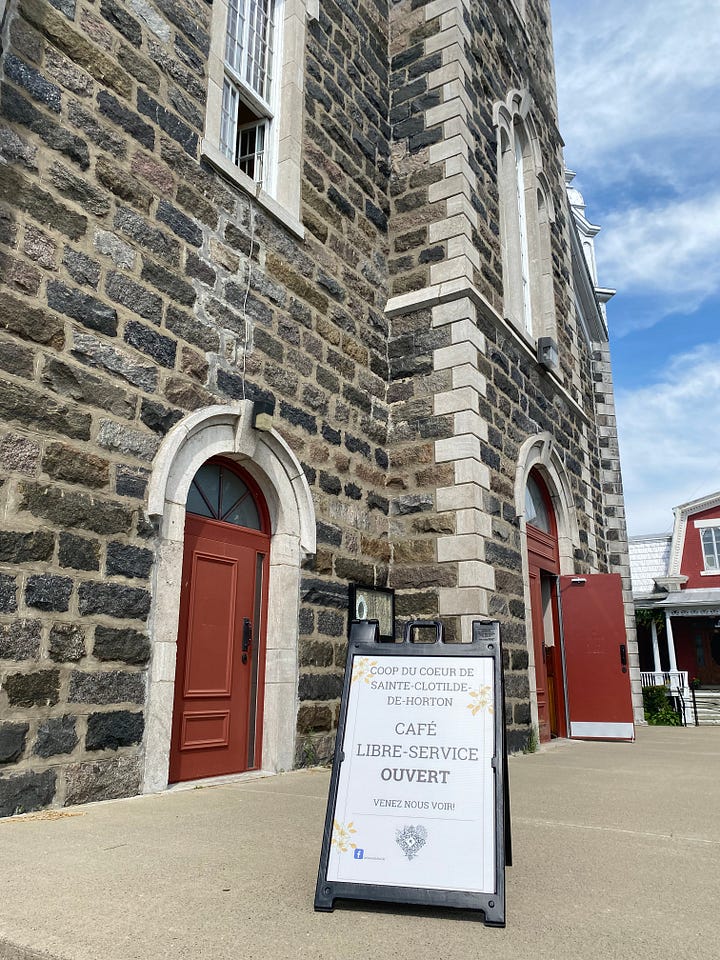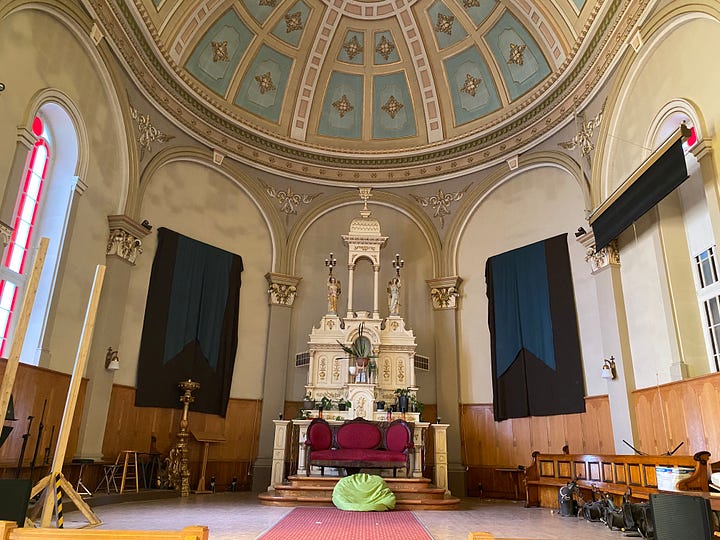July 12, Wednesday — Trois Rivieres
Once again we chose to drive a back road to our next destination — running west of the St. Lawrence seaway.
We took a detour to visit a historic town named Three Rivers (Trois Rivieres). We went to a bit of trouble to do it, and the whole experience was negative. First we had trouble parking the rig. Then we had trouble finding a place to use the restroom, or as they say in Quebec, the toilet. All the museums and shops had signs proclaiming “Toilets for customers only.” I’m not sure why that made me so ticked off, because it’s not uncommon in tourist areas. But then they should have a public facility! We finally saw a cafe — it was hot and the door was standing open so there were a lot of flies around. The place sold coffee and crepes, but no decaf. The waiter said “My boss doesn’t believe in decaf.” OK, so we ordered a crepe to split. Mainly so we could use the toilet.
When the crepe arrived we each took a bite — and then I spotted a mealworm actively crawling on the crepe. My stomach turned and I spit the masticated food from my mouth. Doug called the server who took the plate straightaway to the cook. We went on our way.
(No pictures of this town or meal!)
Clotilde-de-Horton, Gout de Miel
In a tiny town called Clotilde-de-Horton (our destination for the night) we noticed a “Cafe Ouvert” sign outside a large Roman Catholic Church. Our of curiosity, we stopped. The sanctuary was wide open and empty except for one woman who was sitting on a couch, and not interested in speaking with us. The narthex area was full of junky furniture and display tables, with lots of signs about upcoming musical events. At the front of the sanctuary, all the statues and huge religious paintings were intact, but drapes had been hung over two of the windows in the apse. The altar area was intact, but plants had been added, and, rather incongruously, a red Victorian settee and a lime green beanbag. We wandered around a bit. I felt sad that a community could no longer sustain a church like this, and I felt glad the building was still serving the community. Mainly I felt relief that this church building isn’t my problem. Yay for retirement!
I’m getting a sense that the Catholic history of Quebec has left a terrible legacy. Every church appears to be empty and dead. And I understand that very few Protestant churches exist because they were not allowed for long periods of time. I don't know enough about this subject. Perhaps I have already misspoken.


Our next Harvest Host was named Gout de Miel, and was only a mile or two away from that church. We arrived around 4:00 and met the proprietor, Natalie, who keeps bees. She was very personable. She has a small shop area where she does honey tastings and sells everything bee-related, such as soaps, candles, baked goods, and of course honey. She asked us to wait to do the honey tasting because another rig was scheduled to show up. Meanwhile she needed to drive out to tend her bees.
Since we missed any kind of lunch, we bought a honey cake from Natalie. I was very ready to sit somewhere comfortable and eat something. It was rather hot and there were tons of flying insects, so we ate in Big Blue. A small creek nearby was raging with brown water — they’ve had so much rain lately. (Across the border, in Vermont, they are experiencing floods right now, so it’s not surprising to see high water here.)
Another truck camper showed up around 5:00. It was a young couple, Joelle and Jejune (sp?), with their one year old daughter, Lily. We don’t often get to meet other folks in truck campers, so that was fun. They are from Switzerland and had flown to Canada and purchased a truck camper in order to spend a year on the road. They were happy to talk, and we stood outside our rigs swapping stories. They bought their rig from a private seller in Montreal. I asked if that was difficult and Joelle readily told me the whole story, it sounded like quite an ordeal.
They are snow board instructors and also climbing instructors. Their plan is to cross Canada east-to-west and then go down into California, working sometimes along the way. I wish them well. If you see them, say Hi from us!

Natalie the beekeeper was late, so Doug and I fixed some supper before we sampled the honey. Around 6:30 we bought a small jar of ginger flavored honey and a date cake, in addition to the previous honey cake.
July 13, Thursday — Juneau Chalets
Once again we opted for a secondary road. When I searched for a breakfast restaurant, we ended up in Victoriaville at a chain restaurant called “Ben & Florentine”. We love our Quebec breakfasts!
We chatted extensively with two different servers. First was the young woman who seated us, who said she was eager to practice her English, and curious about our travels. Then the young man who served us, who was studying to be a Phys Ed teacher. He asked us how we came to be in Victoriaville, as they rarely get Americans there.
While we were eating it started raining. There was an IGA across the parking lot, so we bought some groceries. It makes Doug very happy to shop in grocery stores in other countries. He loves trying to decipher all the labels and is always buoyant afterward. It’s true that you feel like you’ve really visited a town when you shop in their grocery store, or pop into their library. Those two places tell you everything.
Things we have noticed about Quebec so far:
Lots of laundry hanging out to dry
Lots of tiger lilies and day lilies.
Surprised how much farmland there is versus boreal forest.
Everyone seems positively eager to speak English.
Quebec says “toilet” — Ontario says “washroom” — the US says “restroom”.
We arrived at a private campground south of Quebec City. It’s named Juneau Chalets and we have reservations for two nights. There is electricity and water, and available showers, also a small above-ground pool, and a place selling pizza. A lot of the sites here are occupied for the season — you can tell immediately by the permanent-looking decks and decor.
Exceptionally lovely outside, very breezy and cool — actually windy — as a storm front neared. No bugs! We ate a simple supper outside — salad and a roll with cheese and the date bar. We got out our brand new decks of cards to play Shanghai. But the wind made card playing impossible.
A huge storm moved overhead, quickly now. Such crashing thunder and simultaneous lightning! Plus the deafening sound of rain on our roof. We watched an episode of Mad Men using the subtitles because we couldn’t hear a thing. Then fall asleep to the drumming of rain.
July 14, Friday — Montmorency Falls
Our campsite was a mud pit in the morning. We were able to change to a different spot for our second night.
But meanwhile we headed out for the day and drove to Montmorency Falls, northwest of Quebec City. They are practically in the city itself. I was surprised how highly developed the falls area was. I don’t know what I expected. Not a zipline. I still imagine falls to be a wooded walk into a secluded area. But in Quebec the falls have all been harnessed for power.
The falls are stunning — I believe a greater drop than even Niagara Falls. You can walk right across them on a footbridge.


Then we took a “panoramic stairway” that descends beside the falls — close enough to feel the spray. The water was running high as there has been a lot of rain in general, plus last night’s big storm. Lots of people there. You could go zip-lining, “tyrolienne” across the falls, which was fun to watch. We walked until we got hot. Then we found some shade and ate our small packed lunch.


All around Montreal the highways are very congested and driving on them in Big Blue is not fun. I’m glad that when we head to Quebec City, next, we will stay at a hotel for 3 nights and use Ubers instead of attempting to drive in the city.
Next: a fabulous historic site — Grosse Isle and the Irish National Memorial.



Enjoying a vicarious trip through Quebec. Your observations about the church situation is fodder for thought. I'm no expert either, but I remember reading that the Catholic church in Quebec did not have to deal with the French Revolution. This made it more conservative and less able to respond to the modern world. This was in a book called The St. Lawrence by Henry Beston. You might find it interesting to read because it travels through the area you are visiting 80 years ago.